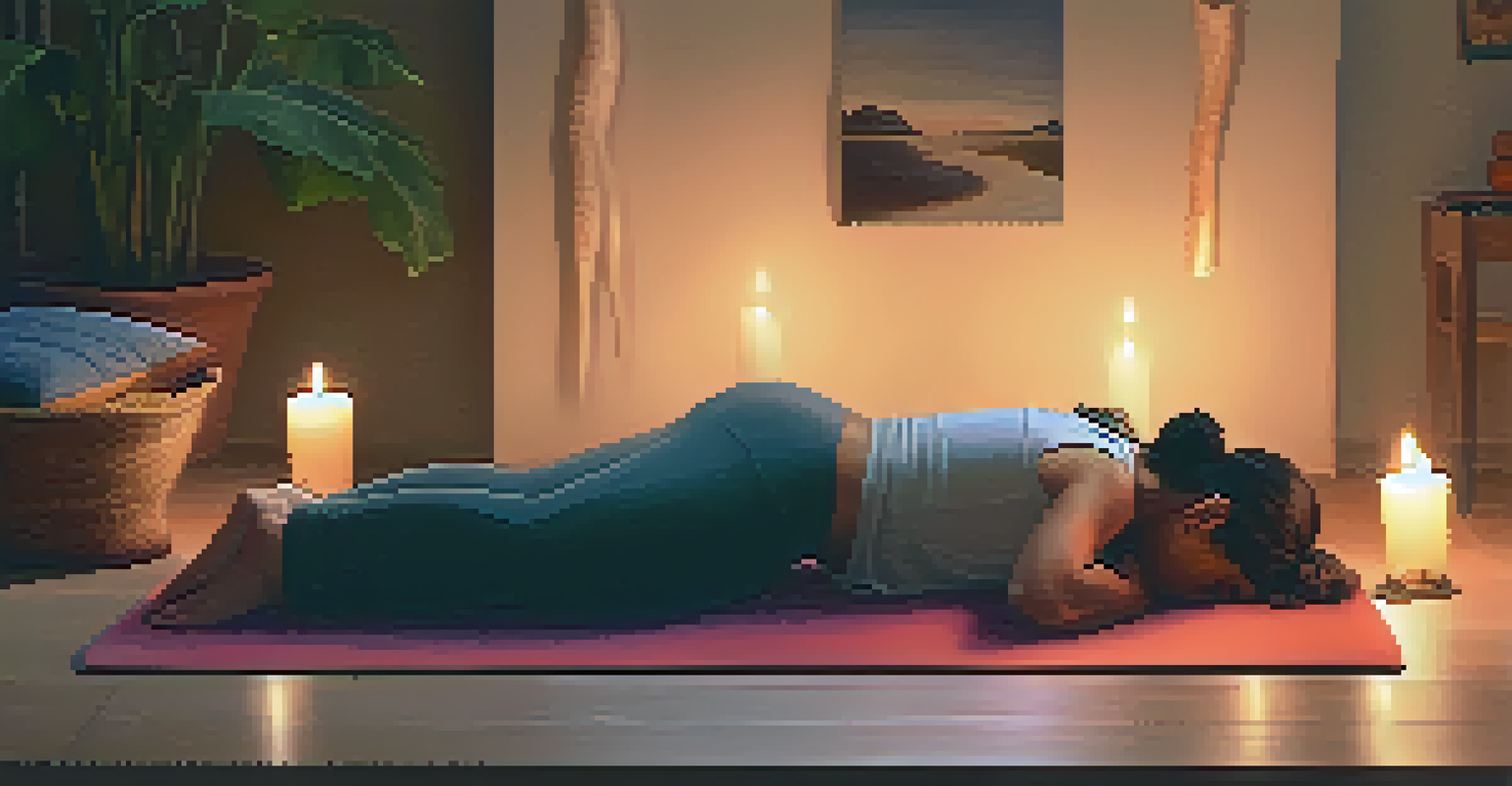Yoga Poses That Promote Resilience and Emotional Balance

Understanding Resilience and Its Importance
Resilience is the ability to bounce back from challenges and adversity. It's not just about enduring difficult times; it's about thriving in the face of them. Many factors contribute to resilience, including emotional balance, which helps us navigate life's ups and downs with grace and strength.
The greatest glory in living lies not in never falling, but in rising every time we fall.
Emotional balance allows us to manage our feelings and responses effectively. When we cultivate this balance, we become more adaptable and better equipped to handle stress. By integrating yoga into our lives, we can enhance our resilience and emotional well-being in profound ways.
Yoga teaches us to connect with our bodies and minds, offering tools to help us cope with life's inevitable challenges. Through mindful practice, we can learn to regulate our emotions and develop a greater sense of control, which is crucial for resilience.
The Power of Breath: Pranayama Techniques
Breath is often referred to as the bridge between the body and mind. In yoga, pranayama, or breath control, plays a vital role in fostering resilience and emotional balance. By focusing on our breath, we can calm our nervous system and create a sense of inner peace.

Simple pranayama techniques, such as deep belly breathing or alternate nostril breathing, can quickly reduce anxiety and stress. These practices encourage mindfulness and help us cultivate a positive mindset, making them essential for emotional regulation.
Resilience Enhances Emotional Balance
Cultivating resilience through practices like yoga allows us to manage stress and navigate life's challenges more effectively.
When we incorporate pranayama into our daily routine, we not only enhance our physical health but also build mental resilience. This connection between breath and emotional well-being is a powerful tool for navigating life's challenges.
Mountain Pose: Grounding and Stability
Mountain Pose, or Tadasana, is a foundational yoga pose that promotes grounding and stability. By standing tall with our feet firmly planted, we cultivate a sense of strength and resilience. This pose encourages us to connect with the earth and find balance in our bodies and minds.
It is not the strongest of the species that survive, nor the most intelligent, but the one most responsive to change.
As we practice Mountain Pose, we can focus on our breath and bring awareness to our thoughts. This mindfulness helps us clear mental clutter and enhances our ability to face challenges with a calm and centered mindset.
In moments of stress, returning to Mountain Pose can serve as a reminder to stand firm in our beliefs and values. By embracing this pose regularly, we can build a solid foundation for emotional balance.
Warrior II: Embracing Strength and Courage
Warrior II, or Virabhadrasana II, is a dynamic pose that embodies strength and courage. By extending our arms and opening our hips, we create a powerful posture that encourages resilience. This pose invites us to confront our fears and stand firm in the face of adversity.
As we hold Warrior II, we can visualize ourselves overcoming obstacles and embracing challenges head-on. This mental imagery reinforces our belief in our own strength, which is crucial for emotional balance.
Breath Control Boosts Inner Peace
Pranayama techniques help calm the nervous system, fostering a sense of tranquility and emotional regulation.
Practicing Warrior II regularly helps us cultivate a warrior spirit, reminding us that we have the inner strength to tackle whatever life throws our way. It's a beautiful way to channel resilience and empower ourselves.
Child's Pose: Nurturing Self-Compassion
Child's Pose, or Balasana, is a gentle, restorative pose that encourages self-compassion and relaxation. In moments of stress or overwhelm, this pose allows us to retreat inward and reconnect with our inner selves. It's a safe space to acknowledge our feelings and cultivate emotional balance.
As we rest in Child's Pose, we can take deep breaths and let go of tension in our bodies. This practice helps us develop a nurturing relationship with ourselves, reminding us that it's okay to take a break when we need it.
Incorporating Child's Pose into our routine fosters resilience by teaching us the importance of self-care. By embracing our vulnerability, we can bounce back stronger and more balanced.
Tree Pose: Cultivating Focus and Balance
Tree Pose, or Vrksasana, is an excellent pose for improving focus and balance. By finding our center and rooting down through one foot, we learn to maintain stability amidst life's fluctuations. This practice is a metaphor for resilience, reminding us to stay grounded even when things get shaky.
As we practice Tree Pose, we can visualize ourselves as strong trees, swaying gently but never breaking. This imagery reinforces our ability to adapt and persevere through challenges.
Yoga Poses Foster Strength and Focus
Practicing poses like Warrior II and Tree Pose encourages physical stability and mental clarity, reinforcing our ability to face adversity.
By incorporating Tree Pose into our yoga practice, we enhance our mental clarity and emotional balance. It's a beautiful way to remind ourselves of our inner strength and capacity for growth.
Cobra Pose: Opening the Heart and Mind
Cobra Pose, or Bhujangasana, is a heart-opening pose that cultivates confidence and emotional balance. By lifting our chest and shoulders, we create space for vulnerability and self-acceptance. This pose encourages us to embrace our emotions rather than suppress them.
As we practice Cobra Pose, we can focus on our breath and allow ourselves to feel whatever arises. This openness fosters resilience by helping us process our emotions and respond to life's challenges with grace.

Integrating Cobra Pose into our routine is a powerful way to build emotional strength. It teaches us the importance of vulnerability and self-acceptance in our journey toward resilience.
Incorporating Yoga into Daily Life for Resilience
Incorporating yoga into our daily lives is essential for building resilience and emotional balance. Whether it's a short morning routine or a few minutes of stretching throughout the day, consistency is key. The more we practice, the more we cultivate a resilient mindset.
Setting aside time for yoga allows us to connect with ourselves and process our emotions. Even simple poses can create a significant impact on our overall well-being, making it easier to navigate life's challenges.
Remember, resilience is a journey, not a destination. By making yoga a regular part of our lives, we can enhance our emotional balance and empower ourselves to face whatever comes our way.